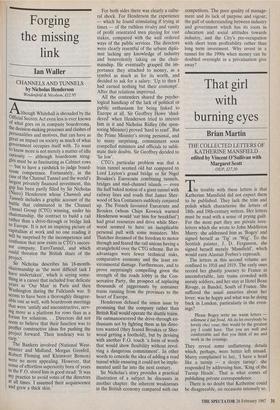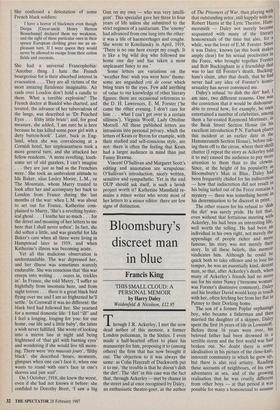That girl with burning eyes
Brian Martin
THE COLLECTED LETTERS OF KATHERINE MANSFIELD edited by Vincent O'Sullivan with Margaret Scott OUP, £17.50 The trouble with these letters is that Katherine Mansfield did not expect them to be published. They lack the trim and polish which characterise the letters of 18th- and 19th-century writers. Her letters must be read with a sense of prying guilt. For the most part they are private love- letters which she wrote to John Middleton Murry: she addressed him as 'Bogey' and signed herself as Tig' or 'Wig'. To the Scottish painter, J. D. Fergusson, she signed herself merely 'Mansfield', which would earn Alastair Forbes's reproach.
The letters in this second volume are confined to 1918 and 1919. The early ones record her ghastly journey to France in uncomfortable, late trains crowded with unruly soldiers, and her stay at Hotel Beau Rivage, in Bandol, South of France. She suffered the usual anxieties about her lover: was he happy and what was he doing back in London, particularly in the even- ings?
Please Bogey write me warm letters tenement it fait froid. Ah do let everybody be lovely chez vous; that would be the greatest joy I could have. That you are well and comfortable and that you think of me and
work in the evenings. .
They reveal some unflattering details which, perhaps, were better left unsaid. Murry complained to her, 'I have a head like a turnip — a sleepy turnip': she responded by addressing him, 'King of the Turnip Heads'. That is what comes of publishing private correspondence. There is no doubt that Katherine could be disagreeable, on occasions intensely so. She confessed a detestation of some French black soldiers:
I have a horror of blackmen even though Deepa [Great-uncle Henry Herron Beauchamp] declared them my weakness, and the sight of these particular ones in their spruce European clothing gives me an un- pleasant turn. If I were queen they would never be allowed to escape from their cotton fields and coconuts.
She had a universal Francophobia: `Another thing I hate the French bourgeoisie for is their absorbed interest in evacuation . . . They are all victims of the most amazing flatulence imaginable. Air raids over London don't hold a candle to them. What a terrible explosion!' The French doctor at Bandol who charted, and treated, the advance of her tuberculosis of the lungs, was described as 'Dr Poached Eyes . . . filthy little brute'; and, for good measure, she added, 'I am sure he is here because he has killed some poor girl with a dirty button-hook'. Later, back in Eng- land, when she was convalescing at a Cornish hotel, her unpleasantness took a more general turn, and she attacked her fellow residents, 'A more revolting, loath- some set of old guzzlers, I can't imagine . . . they are just as bad as the Frenchies were.' She took an ambivalent attitude to Ida Baker, alias Lesley Moore, L.M., or The Mountain, whom Murry trusted to look after her and accompany her back to London from France during the last months of the war: when L.M. was about to set out for France, Katherine com- plained to Murry, 'She's a revolting hyster- ical ghoul . . . I loathe her so much . . . for the drivel and moaning of her letters to me here that I shall never soften'. In fact, she did soften a little, and was grateful for Ida Baker's care when all three were living in Hampstead later in 1919, and when Katherine's illness was becoming acute.
Yet all this malicious observation is understandable. The war depressed her, and her illness was sometimes scarcely endurable. She was conscious that 'this war creeps into writing . . . oozes in, trickles in'. In France, she told Murry, 'I suffer so frightfully from insomnia here, and from night terrors . . . there is a great black bird flying over me and I am so frightened he'll settle.' In Cornwall it was no different: the black bird had followed her. She yearned for a normal domestic life: 'I feel "ill" and I feel a longing, longing for you: for our home, our life and a little baby', the latter a wish never fulfilled. She wrote of looking into a mirror late at night and being frightened of 'that girl with burning eyes' and wondering if she would live till morn- ing. There were Wes mauvais jours', 'filthy black': she described 'hours, moments, glimpses when one can't face it, when one wants to stand with one's face in one's sleeves and just wail'.
On 5 October, 1918, she knew the worst, even if she had not known it before: she confided to Dorothy Brett, 'I saw a big Gun on my own — who was very intelli- gent'. This specialist gave her three to four years of life unless she submitted to the strict regimen of a sanitarium. The 'enemy' had advanced from one lung into the other: it was a life of haemorrhages and coughs. She wrote to Koteliansky in April, 1919, `There is no one here except my cough. It is like a big wild dog who followed me home one day and has taken a most unpleasant fancy to me.'
Some letters are variations on the `weather fine: wish you were here' theme: some are anguished cris de coeur which bring tears to the eyes. Few add anything of value to our knowledge of other literary figures: there are occasional references to the D. H. Lawrences, E. M. Forster Ole came the other evening. I don't care for him . . . what I can't get over is a certain silliness'), Virginia Woolf, Lady Ottoline Morrell. All these published letters are intrusions into personal privacy, which the letters of Keats or Byron for example, with their studied and self-conscious style, are not: there is often the feeling that Keats had a larger audience in mind than just Fanny Brawne.
Vincent O'Sullivan and Margaret Scott's editing and annotation are scrupulous: O'Sullivan's introduction, nicely written, sensitive and sympathetic. Yet in the end OUP should ask itself, is such a lavish project worth it? Katherine Mansfield re- mains a minor writer who wrote most of her letters to a minor editor: there are few signs of distinction.



















































 Previous page
Previous page